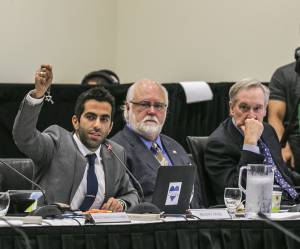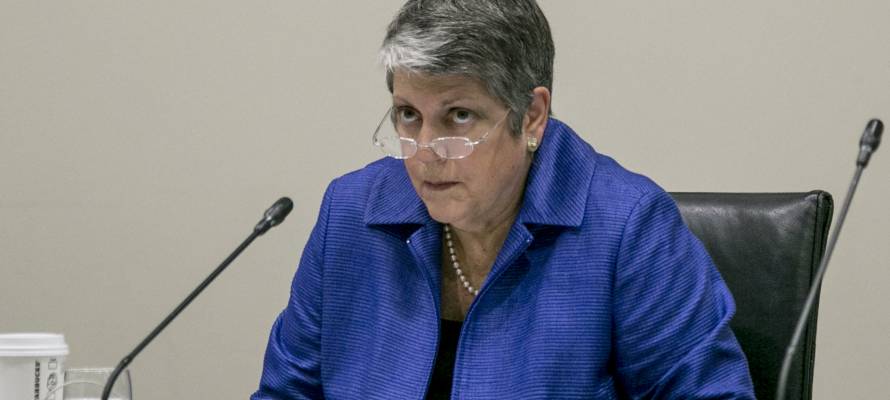
University of California Student Regent, Abraham Oved, left, holds up a Star of David as he addresses the UC Irvine Board of Regents meeting. (AP/Damian Dovarganes)
The University of California Board of Regents is getting public input after a proposed policy on intolerance was roundly rejected by Jewish organizations that say it doesn’t go far enough to address anti-Semitism on campuses.
Dozens are expected to voice their opinions at a forum Monday at the University of California, Los Angeles.
The university system has become a focal point in the discussion of freedom of expression on campus following several high-profile incidents, including one in which swastikas were spray painted onto a UC David Jewish fraternity house.
The UC’s governing board considered a policy rejecting intolerance and upholding academic freedom drafted by the president’s office at its meeting in September. Jewish groups contested it was too weak and needed to specifically address antisemitism.
“We understand that the university has an obligation to ensure freedom of speech,” said Tammi Rossman-Benjamin, a professor at UC Santa Cruz and director of the AMCHA Initiative, which investigates cases of antisemitism on college campuses. “However, they also have an obligation to ensure safety and civil rights.”
UC President Janet Napolitano said in a radio interview in May she believed the university system should adopt the State Department’s definition. Her remarks drew criticism from free speech advocates and critics of Israel’s policy toward Palestine, who said they feared it could be used to silence them.
“I do believe it is the most authoritative and well-respected definition of antisemitism that is consistent with the understanding of the vast majority of the Jewish community,” said Rossman-Benjamin.
The proposed policy defined intolerance as “unwelcome conduct” motivated by discrimination or hatred toward a group or individuals. It outlined various acts including harassment, hate speech and derogatory use of cultural symbols but did not address any particular group.
Peter Scheer, executive director of the First Amendment Coalition, said it would be difficult for the board’s working group to draft a policy that more precisely defines intolerance without infringing on free speech protections.
“In all but the most extreme circumstances they’re going to find that the First Amendment is an obstacle that they cannot surmount and shouldn’t,” said Scheer, referring to the constitution’s guarantee of free speech.
By: Christine Armario, AP
Do You Love Israel? Make a Donation - Show Your Support!
Donate to vital charities that help protect Israeli citizens and inspire millions around the world to support Israel too!
Now more than ever, Israel needs your help to fight and win the war -- including on the battlefield of public opinion.
Antisemitism, anti-Israel bias and boycotts are out of control. Israel's enemies are inciting terror and violence against innocent Israelis and Jews around the world. Help us fight back!



